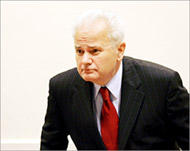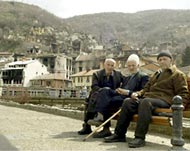Ethnic Albanian party wins in Kosovo
Kosovo’s largest ethnic Albanian party has won general elections in the UN-run province, but failed to gain the absolute majority needed to govern alone.

According to final results released on Wednesday, President Ibrahim Rugova’s Democratic League of Kosovo won 45.42% in the 23 October elections, which were overshadowed by a boycott by the Serb minority.
The Democratic Party of Kosovo, led by former rebel leader Hashim Thaci, came in second with 28.85%.
It was followed by the party of former rebel commander turned politician Ramush Haradinaj, the Alliance for the Future of Kosovo, with 8.39%, officials said.
A new movement run by the wealthy Kosovo publisher Veton Surroi finished fourth with 6.23%.
Rugova’s party will now have to form a coalition government, and must choose among these three parties for a partner.
In the previous elections in 2001, a similar result led to a political stalemate for three months, with the parties unable to agree to a power-sharing deal.
Serb boycott
This year’s general elections were the second in Kosovo since the end of the war in 1999 between ethnic Albanian rebels and Serb forces loyal to the former Yugoslav president Slobodan Milosevic.
The 120-seat parliament will choose a president and a government which holds some power, although the ultimate authority on decision-making rests with the UN mission.
|
|
|
Deep divisions stand in the path |
The parties have two days to lodge formal complaints before results are certified, said OSCE official Jens Modvig.
He urged the parties to accept the results and quickly form a coalition government.
Overall turnout was 53.57%, according to the Organisation for Security and Cooperation in Europe, which jointly supervised the vote with the province’s Central Election Commission.
The elections were marred by most Serbs’ refusal to vote in ethnic Albanian-dominated Kosovo, underscoring deep divisions in the province where international officials have tried to create a multi-ethnic society.
Hardline Serb leaders in Kosovo and the rest of Serbia called for the boycott, citing security concerns after a two-day rampage against Serbs earlier this year left 19 people dead and more than 900 injured, while thousands fled their homes.
Kosovo War
They argued that voting would only create a false picture of a multi-ethnic Kosovo and push the province towards independence.
International officials and analysts have said the Serb decision not to vote would deepen their isolation and possibly leave them out of the talks expected next year to decide on the province’s final status.
 |
|
Milosevic is on trail for such mass |
Serbs want Kosovo to remain part of Serbia-Montenegro, the successor union to Yugoslavia. Ethnic Albanians want independence.
Despite the boycott, Serb minority deputies still will be granted 10 seats in the assembly regardless of Serb voter turnout, in accordance with Kosovo law.
Kosovo was placed under UN and Nato rule after the 1999 alliance’s air war that ended Milosevic’s brutal crackdown on independence-minded ethnic Albanians.
The 1998-99 war killed an estimated 10,000 people, mainly ethnic Albanians.
